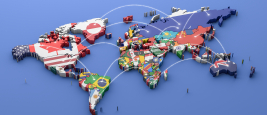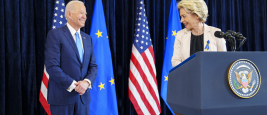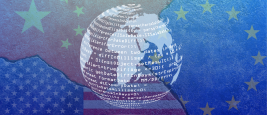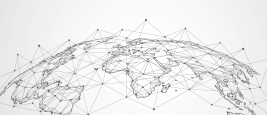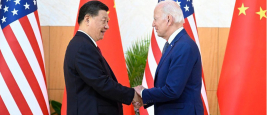While matters related to research security and international partnerships in critical domains are certainly not new, they have become increasingly central to governments, research institutions and industry since the turn of the 2020s.

Geopolitics of Technology

Artificial intelligence (AI), 5G, cybersecurity, robotics, semiconductors, space... Technology, especially in the digital domain, is now deeply affecting all human activities and, by extension, international relations. The resulting political, strategic, economic and social issues manifest themselves at multiple political scales involving states, international organizations and private companies. The dynamics of international competition and cooperation are transformed.
It is to respond to these challenges that Ifri launched the Geopolitics of Technology program in the fall of 2020, which builds on the work it already carried out on these subjects for several years. In 2023, it incorporates Ifri's activities on Space and, in 2024, becomes the Geopolitics of Technology Center.
The Center takes a resolutely European approach to international issues related to so-called critical technologies. Its work is organized around four cross-cutting themes:
- Power: redistributions of power caused by new technologies, in particular digital; military and dual innovations; transformations of international competition;
- Sovereignty: definition of critical infrastructures and technologies; industrial and innovation policies in strategic sectors; opportunities and risks associated with international value chains;
- Governance: ethical and legal issues; interactions between companies, states, international organizations and users; public-private partnerships and GovTech;
- Society: political and social impacts of technological innovations; risks and opportunities for the future of work, health, the fight against climate change; connectivity and economic development.
Head of the Geopolitics of Technology Center
...Research Fellow, Geopolitics of Technology Center
...Research Fellow, Space
...Associate Fellow, Russia / Eurasia and Geopolitics of Technologies Centers
...Associate Research Fellow, Geopolitics of Technology Center
...Former Research Fellow and Head of Ifri's Geopolitics of Technology Program
...In a continuation of U.S. efforts to slow China's development and acquisition of strategic technologies, Washington has imposed new restrictions on American investment in Chinese technology sectors such as artificial intelligence (AI), quantum, and semiconductors.
In April 2021, the Chinese government officially, but rather quietly, established a new state-owned enterprise (SOE) named China SatNet. Its mission: build out China’s “mega-constellation” program for low Earth orbiting internet satellites, known as Guowang (“national network”).
The war in Ukraine has become a showcase for the new commercial paradigm emerging in the space sector (New Space). As such, it seems to confirm the relevance of adaptation efforts led by the United States – more specifically the Pentagon – since the mid-2010s.
Digital technology is an element of power in the international system as well as an area for competition among countries. The study provides a qualitative comparison of the technology policies of nine of the digital middle powers: Brazil, India, Israel, Japan, Kenya, Nigeria, Russia,...
European digital sovereignty has been made a priority by Ursula von der Leyen’s European Commission. Due to the privileged position of American companies in the European market, Brussels’ efforts towards digital sovereignty (on privacy, antitrust, data sovereignty, etc.) are closely...
Open source is at the heart of the Internet infrastructure, of the software used by individuals or governments, and of the innovation processes of tech companies. Faced with threats to the security and sustainability of the open source model, governments are getting a hold of the topic, which...
Numerous smart city projects are emerging, guided by objectives of efficiency and improvement of public policies. All of them are based on intensive use of data and digital tools, but their concrete achievements take various forms. Some models are being exported and are becoming levers of...
In line with the anti-Huawei diplomatic campaign of the Trump and Biden administrations, the United States has promoted an alternative: Open RAN, a concept defined by "open" network architectures. At the intersection of 5G geopolitics and standards, what risks and opportunities does Open RAN...
To succeed in the challenge of reindustrializing France, French and European companies must undertake a dual process of digital and environmental transformation, in a context of international competition.
Digitization of Africa: International Power Plays Conférence hybride
Over the past two decades, increasing attention has been paid to digital infrastructure development and funding on the African continent. Whereas massive infrastructure gaps in funding persist, especially in rapidly growing urban areas, investments in telecom and digital infrastructure have...
AI and Geopolitics: Bridging Global Competition and Cooperation Conférence
Recent developments in artificial intelligence (AI), particularly in generative AI, have renewed the interest of the general public and decision-makers in a field that has long been considered strategic.
Digital Middle Powers: What Strategies in the Global Tech Competition?
In an international context characterized by the ever-growing US-China economic rivalry and technological competition, states caught in the middle of this competition are increasingly having to determine which side they are on.
Space and Quantum Technologies: What Strategies and Industrial Models for Europe? Hybrid conference
Following the German September elections and on the eve of the French Presidency of the European Union, Ifri organized a day of debates on the future of technological sectors of strategic importance in Europe.
Supercomputers and quantum computers: What roles in the technological power of Europe? Les Jeudis de l'Ifri
Strengthening Europe in the digital domain - Franco-German reflections on digital sovereignty Webinar
There is "no strategic autonomy without digital sovereignty", declared Charles Michel, President of the Council of the European Union in February 2021. In this logic, the European Commission calls for a more autonomous Europe in security-related areas such as digital policy and data...
Digitalization in the (post) COVID World: Views from Japan and Europe
The COVID-19 crisis has highlighted the importance of accelerating the digital transformation of both the industry and the society.
Conversation on Technological Change and its Implications, with Audrey Tang, Digital Minister, Taiwan Videoconference
To conclude our webinar series on "Technological Revolution and Regional Order in East Asia", we will host Audrey Tang, Digital Minister of Taiwan, to discuss the scope of...
Technological Revolution and Regional Order in East Asia Webinar Series
Against an increasingly tense backdrop of geopolitical competition, a new wave of rapid technological change is likely to transform the regional landscape of East Asia.
China has just announced controls on exports of rare minerals - gallium and germanium - whose production it dominates and which are essential for the manufacture of electronic components.
In a typically French move, France's top lawmakers are refusing to side with the United States and single out China's TikTok.
Barriers being put up by the US, China and the EU could hinder scientific progress at a time when it is most urgently needed, according to OECD’s latest report on the global R&D outlook.
The US struggles to retain its supremacy, China catches up and overtakes the leader in many areas while the EU is falling behind.
The United States are ramping up its efforts to deny China access to the most advanced semiconductors powering smartphones, personal computers and the latest generation of supercomputers.
Disagreements have opened up about strategy when China is also seen as an existential threat. Western powers in the G7 group of nations are failing to coordinate their China strategies, senior western officials admit, adding that the need to do so has been given sharp impetus by Xi Jinping’s...
Following assertions of OpenRAN solutions offering costs cuts and shortcuts to 5G and even claims of superior security, a series of reports from governments, scientific labs, security expert and think tanks investigate the technology. They showcase perspectives from the United State,...
Alice Pannier is leading a new programme looking at the relationship between technology and geopolitical alliances. Recent events have proven this to be more important than ever.
Technologies from big data to quantum computing, artificial intelligence and next-generation drones are fueling power struggles between nations and large industrial companies. Alice Pannier, head of the...













